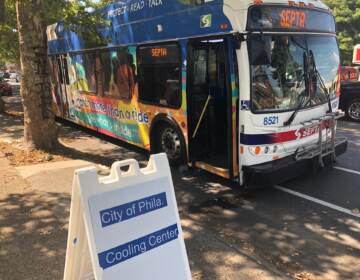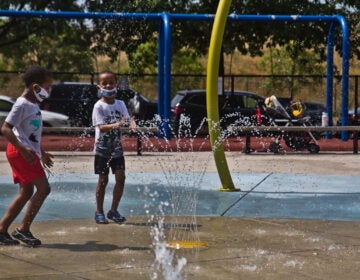As NYC gives at-risk seniors AC units, Philly asks them to find relief in a neighbor’s home
While New York has processed over 25,000 requests for air conditioning units, Philadelphia has struggled to come up with a plan to protect residents from the heat.
Listen 1:57
Gloria and Hugo Nievas just bought an air conditioner to install in their Hunting Park home. (Kimberly Paynter/WHYY)
Gloria and Hugo Nievas, 83 and 91, had a plan for weathering the extreme heat that’s afflicted the city over the last week: Hunker down in their Hunting Park home and turn on their five fans.
The couple, who count several health conditions between them, including asthma, live in one of the city’s hottest areas where temperatures can climb 22 degrees Fahrenheit higher than wealthier and greener areas of the city. And like many of their neighbors in the predominantly Black and Latino neighborhood, they haven’t had air conditioning.
“We couldn’t afford it,” said Gloria in Spanish, referring to air conditioning.
But last week’s heat put them on the edge. Gloria, who is originally from El Salvador, said her body ached. Hugo, an Argentinian immigrant, said he had trouble breathing. Both were having trouble sleeping. Finally, with the help of a friend, the couple was able to get a brand new Energy Star air conditioner unit for $246.
“It will be a relief,” said Gloria on Tuesday, while the husband of their home attendant and Hugo installed the window unit in their room on the second floor of the three-bedroom rowhouse they rent for $1,000 a month on West Lycoming Street.
Hugo said his pension is about $800. He used to drive taxis but he lost his license years ago and the coronavirus pandemic has made it impossible for him to earn extra money cutting grass or doing other small jobs that in the past helped the couple make ends meet. Like many working-class Philadelphians, air conditioning was — until Tuesday — a luxury out of reach.
Yet if the Nievas still lived in New York City, where they met and lived for decades, they would have been eligible to receive a free air conditioning unit from the local government — one of the 74,000 AC units NYC is providing free-of-charge to low-income senior residents.
In May, with a hot summer rolling in atop of a deadly pandemic, New York Mayor Bill de Blasio rolled out a COVID-19 Heat Wave Plan aimed at keeping vulnerable New Yorkers safe from the heat at home since regular cooling options outside the home wouldn’t be accessible.
“This summer will be unlike any that New York City has seen before,” de Blasio said in a statement. “As the temperature rises, we must protect our most vulnerable from the dangers of extreme heat. We’re providing tens of thousands of free air conditioners to low-income seniors and creating brand new spaces, both indoor and out, for New Yorkers to keep cool and stay safe.”
While New York has processed over 25,000 requests for air conditioning units over the past month, Philadelphia has struggled to come up with a plan to proactively combat heat-related dangers. City officials say they don’t have the money for a program like de Blasio’s and instead, are asking residents to help one another.
The plan for seniors with no access to air-conditioned spaces: Visit a neighbor with AC.
“There’s a limited number of [cooling] centers, and it’s difficult for people to get there,” Health Commissioner Thomas Farley said. “A cooling center may be a site where the virus could be transmitted. So that’s why we’re talking so much about people helping their neighbors — it’s a safer way to stay cool, and we do think we can reach a lot of people that way.”
The lack of government assistance affects working-class and low-income residents who can’t afford air conditioner units, higher electric bills or a trip to the beach. In a city where economic disparities fall along racial lines, that means a disproportionate impact falls on Black, Indigenous and people of color. The same disparity plays out geographically so that the hottest parts of the city — Hunting Park, Point Breeze in South Philadelphia, and parts of Haddington and Cobbs Creek in West Philadelphia — are home to predominantly Black and immigrant communities, according to data gathered by the city’s Office of Sustainability
‘I’m afraid because of my age’
Hugo and Gloria Nievas say that they wouldn’t feel safe leaving their home and going into a neighbor’s house as recommended by the city’s heat plan. They moved from New Jersey about a year ago, and they don’t really know their neighbors. And nor would their neighbors be able to accommodate, given the risks of the pandemic.
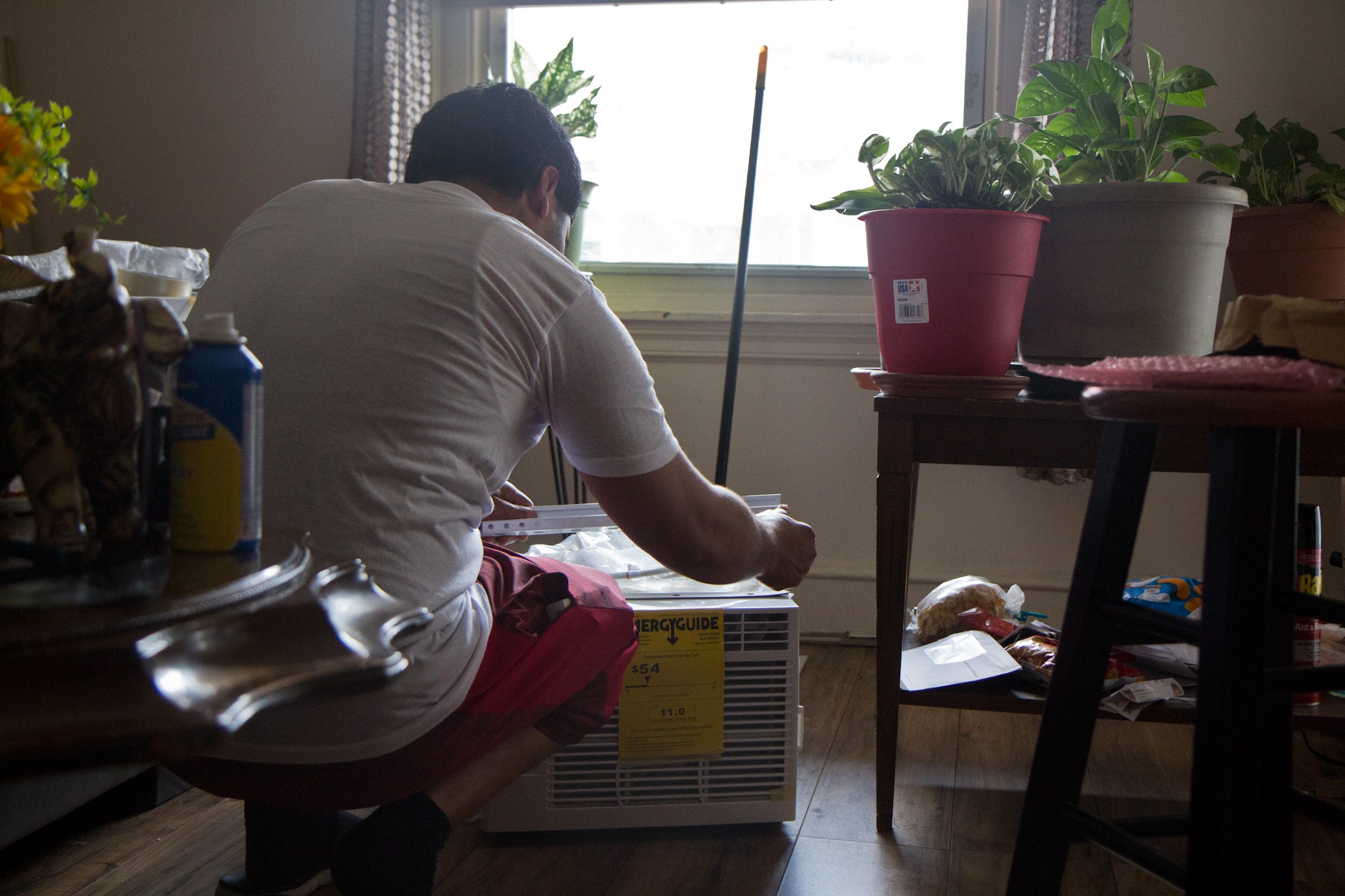
Dionisio and Dolores Robles live a block away from the Nievas. They have air conditioners in all of their rooms. But they wouldn’t invite strangers into their home right now, they said.
“We are worried about the COVID,” Dolores, who is 70 years old and suffers from diabetes, said in Spanish sitting outside on their porch. “Here, not even the family comes inside the house. When they come to bring us things, they leave it outside the door and we bring them in.”
“I’m afraid because of my age, 83,” said Dionisio in Spanish. “If COVID gets me, I’m gone in a day.”
Farley acknowledged those concerns with warnings that since heat-vulnerable populations also have a greater risk of death if they get the coronavirus, everyone in an AC-hosting house should wear a mask, stay 6 feet apart from each other and wash their hands constantly.
“Depending on the circumstances, that may be far safer than having them group with a bunch of other people in a small place,” Farley said.
At a press conference last week where officials explained the limited resources available for Philadelphians without air conditioning at home, Farley laid out the deadly risks that come with heat.
“More people die from heat waves than hurricanes, earthquakes, tornadoes or floods,” Farley said. This year, with the added threat of the pandemic, experts say heat could be even more dangerous.
Yet, because of budget and social distancing needs, the city is providing less resources for Philadelphians to stay cool than in previous years. Pools won’t open and most daily senior centers are closed, and although the city’s intent is to activate 12 libraries and some senior centers as cooling centers with extended hours in the case of a heat emergency, the locations are not clear yet.

Subscribe to PlanPhilly
Philadelphia Managing Director Brian Abernathy said Mayor Jim Kenney’s administration recognizes the need for extra resources to keep people vulnerable to the heat safe. He said officials are working with nonprofits, PECO and private entities to provide fans and other “heat relief” and “cooling agents.”
“Those conversations continue,” Mike Dunn, a spokesperson for the administration, said in an email. “City Council just approved a budget that closes a projected $750 million dollar deficit for the coming year – the largest potential revenue shortfall the City has ever faced. In that context, we would of course greatly welcome even one tenth of the level of support for this issue that New York City is fortunate to receive.”
The de Blasio administration created the $55 million program with help from partners — the New York City Housing Authority gave $10 million. The New York State Energy Research and Development Authority committed another $20 million. A $70 million grant from the New York State Public Service Commission will help 440,000 families with their electric bills from June to October. By the middle of June, over 25,000 people had requested air conditioning units.
Abernathy stressed the need for partners outside of city government, like the partners who supported the New York program.
“The city is going to do everything we can to provide the resource that our residents need and protect them from extreme heat and other emergencies as we move forward,” Abernathy said. “But we can’t do it alone.”
While pools won’t open this summer, the city is operating 91 spray grounds across the city and distributing “cooling kits” including umbrellas, tents, cooling rags and misting fans for use by people on the city’s 100 Playstreets.
But it appears unlikely that the city would be able to roll out a major new program in time to beat the heat.
A spokesperson for the Philadelphia Housing Authority, Nichole L. Tillman said she was unaware of any plans to work with City Hall to provide heat relief for public housing residents beyond the efforts PHA already has in the works. The agency does not “have the resources to provide air conditioners during the pandemic,” she said.
The Pennsylvania Department of Environmental Protection, which hosts the Pennsylvania Energy Development Authority and the Office of Environmental Justice, was also unaware of city initiatives regarding air conditioners, fans or heat relief.
“At this time, DEP is not working on any initiatives such as this,” said Virginia Cain, a spokesperson for the agency.
Advocates call foul
Erika Almirón, former executive director of Latinx community nonprofit Juntos and former candidate for City Council, said the lack of resources allocated by the city to protect residents from heat shows how vulnerable populations are left behind.
“It’s unfortunate that during a pandemic, in our city, the people are forced to figure out how to survive. With the humidity we have had, days that have reached over 100 degrees. For seniors, this is life-threatening. And so is contracting COVID, if you’re older,” she said.
Almirón said she would never advise her father, a lung cancer survivor, to go to a neighbor’s house to cool off or to let anyone in at this time.
“If the city had decreased the police budget by the $120 million the people had asked, they would have the money to protect our families. Unfortunately, this makes it abundantly clear where their priorities are,” Almirón said.
Meanwhile, PECO is not disconnecting residents who can’t afford their electric bills and is suspending late payment charges. The utility is providing help by setting up flexible payment arrangements and providing information on financial assistance.
But environmental justice organization Earth Quaker Action Team said that’s not enough, because at the end of the day, people are just accumulating bills they will never be able to pay.
“Promising not to shut off services without forgiving missed bill payments only delays the inevitable,” said Dana Robinson, a volunteer at EQAT, in a press release by the end of June.
The Pennsylvania Department of Human Services enabled the Low-Income Home Energy Assistance Program (LIHEAP) this summer, which provides up to $800 per household to help residents pay their energy bills.
The Nievas didn’t know about the program, but Gloria said they will apply. As for the heat relief currently offered by the city, she doesn’t think she will use it now that they own an AC. Leaving the house is too risky for them, she said, and walking in the heat to go to a sprayground doesn’t really make sense for them. Plus, the closest one to their home is a 30-minute walk away.
“I’m never leaving the house now,” she said smiling.
 WHYY is one of over 20 news organizations producing Broke in Philly, a collaborative reporting project on solutions to poverty and the city’s push towards economic justice. Follow us at @BrokeInPhilly.
WHYY is one of over 20 news organizations producing Broke in Philly, a collaborative reporting project on solutions to poverty and the city’s push towards economic justice. Follow us at @BrokeInPhilly.
WHYY is your source for fact-based, in-depth journalism and information. As a nonprofit organization, we rely on financial support from readers like you. Please give today.



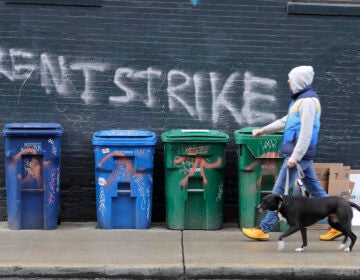
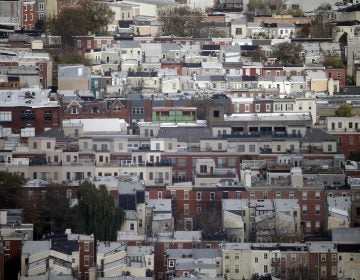

![CoronavirusPandemic_1024x512[1]](https://whyy.org/wp-content/uploads/2020/03/CoronavirusPandemic_1024x5121-300x150.jpg)

